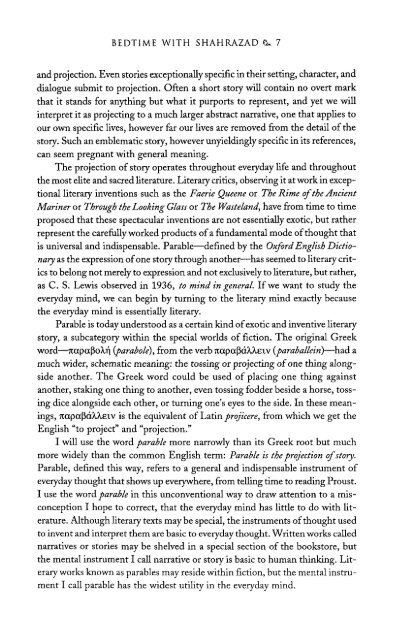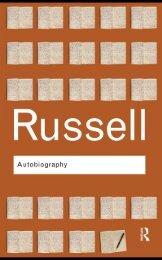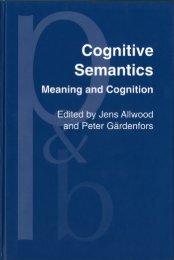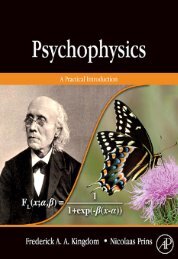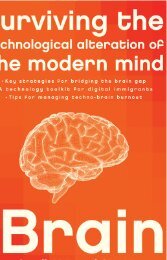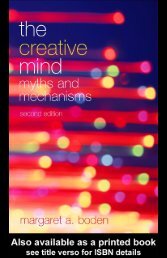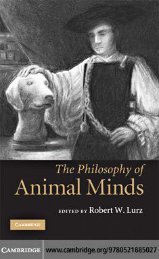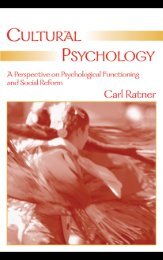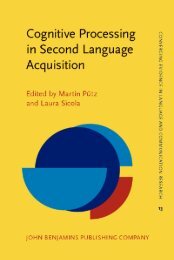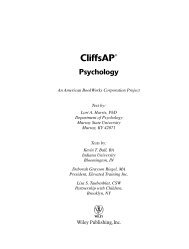The Literary Mind.pdf
The Literary Mind.pdf
The Literary Mind.pdf
Create successful ePaper yourself
Turn your PDF publications into a flip-book with our unique Google optimized e-Paper software.
BEDTIME WITH SHAHRAZAD<br />
and projection. Even stories exceptionally specific in their setting, character, and<br />
dialogue submit to projection. Often a short story will contain no overt mark<br />
that it stands for anything but what it purports to represent, and yet we will<br />
interpret it as projecting to a much larger abstract narrative, one that applies to<br />
our own specific lives, however far our lives are removed from the detail of the<br />
story. Such an emblematic story, however unyieldingly specific in its references,<br />
can seem pregnant with general meaning.<br />
<strong>The</strong> projection of story operates throughout everyday life and throughout<br />
the most elite and sacred literature. <strong>Literary</strong> critics, observing it at work in exceptional<br />
literary inventions such as the Faerie Queene or <strong>The</strong> Rime of the Ancient<br />
Manner or Through the Looking Glass or <strong>The</strong> Wasteland, have from time to time<br />
proposed that these spectacular inventions are not essentially exotic, but rather<br />
represent the carefully worked products of a fundamental mode of thought that<br />
is universal and indispensable. Parable—defined by the Oxford English Dictionary<br />
as the expression of one story through another—has seemed to literary critics<br />
to belong not merely to expression and not exclusively to literature, but rather,<br />
as C. S. Lewis observed in 1936, to mind in general. If we want to study the<br />
everyday mind, we can begin by turning to the literary mind exactly because<br />
the everyday mind is essentially literary.<br />
Parable is today understood as a certain kind of exotic and inventive literary<br />
story, a subcategory within the special worlds of fiction. <strong>The</strong> original Greek<br />
word—napaponn (parabole), from the verb napapanneiv (paraballeiri)—had a<br />
much wider, schematic meaning: the tossing or projecting of one thing alongside<br />
another. <strong>The</strong> Greek word could be used of placing one thing against<br />
another, staking one thing to another, even tossing fodder beside a horse, tossing<br />
dice alongside each other, or turning one's eyes to the side. In these meanings,<br />
napapanneiv is the equivalent of Latin projicere, from which we get the<br />
English "to project" and "projection."<br />
I will use the word parable more narrowly than its Greek root but much<br />
more widely than the common English term: Parable is the projection of story.<br />
Parable, defined this way, refers to a general and indispensable instrument of<br />
everyday thought that shows up everywhere, from telling time to reading Proust.<br />
I use the word parable in this unconventional way to draw attention to a misconception<br />
I hope to correct, that the everyday mind has little to do with literature.<br />
Although literary texts may be special, the instruments of thought used<br />
to invent and interpret them are basic to everyday thought. Written works called<br />
narratives or stories may be shelved in a special section of the bookstore, but<br />
the mental instrument I call narrative or story is basic to human thinking. <strong>Literary</strong><br />
works known as parables may reside within fiction, but the mental instrument<br />
I call parable has the widest utility in the everyday mind.<br />
7


